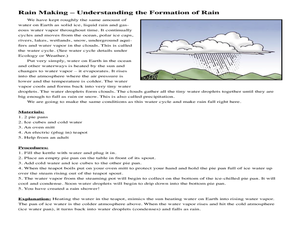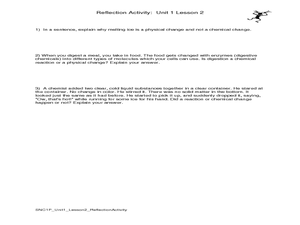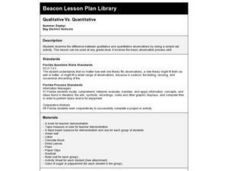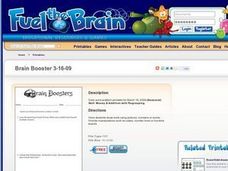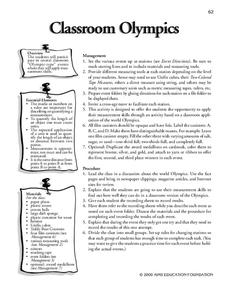Curated OER
Brain Booster: Subtraction Strategy- Working Backward
In this daily math problem worksheet, students complete three activities that help them use subtraction and work backwards. Students show their work using pictures, numbers, or words and may use cubes, number lines or hundred boards for...
Curated OER
Brain Booster
In this combinations worksheet, students complete several activities that help them make combinations from number sets. Students may show their work using pictures, numbers, or words. Students may also use cubes, number lines, or hundred...
Curated OER
Rain Making - Understanding the Formation of Rain
Pupils read and conduct and experiment to learn about rain formation. In this water forms lesson, students read about the formation of rain and its purposes. Pupils then complete a rain experiment activity.
Curated OER
Calculating Area
In this area worksheet, students calculate the area of shaded figures shown on grids. A reference web site is given for additional activities
Curated OER
Capture the Circle (A Fraction Game)
Fourth graders compare and order fractions in a fraction game activity. In this fraction game instructional activity, 4th graders play a game that requires them to add fractions with like denominators and compare fractions. Students...
Curated OER
Patterns
Second graders create an ABAB pattern with their name. In this early elementary math lesson, 2nd graders first model their names in an ABAB pattern with unifix cubes. They then recreate the pattern using letter stamps on KidPix.
Curated OER
Physical and Chemical Changes
Learners differentiate physical and chemical changes. In this chemistry lesson, students identify five indicators that a chemical change took place. They complete a reflection journal at the end of the activity.
Curated OER
Rock Cycle
Students explain the processes involved in the rock cycle. In this earth science instructional activity, students identify the different kinds of rocks. They complete a worksheet during the activity.
Curated OER
Qualitative Vs. Quantitative
Fourth graders examine the difference between qualitative and quantitative observations by doing a simple lab activity. This instructional activity can be used at any grade level. It involves the basic observation process skill.
Curated OER
Surface Area and Volume of a Cylinder
Seventh graders find the surface area and volume of a cylinder. In this area and volume lesson, 7th graders complete several activities to learn the volume and surface area of cylinders.
Curated OER
Adequate Standard of Living: Children's Rights
Students and parents participate in a variety of activities designed to explore the issue of every person's right to adequate housing. They make butter, make models of different types of housing, read books, discuss the rights and...
Curated OER
Who Hid the Milk Products?
Students study milk products and learn their health benefits. In this milk products lesson, students discuss dairy products. Students participate in a game of milk product identification. Students also discuss categorizing milk by their...
Curated OER
MOSAICS
This instructional activity will teach the students about how Mosaics are made and how they have been used in the past history and in modern times. Students will construct their own paper mosaics.
Curated OER
Shakespear Scavenger Hunt
Learners use the internet to study basic biographical facts about Shakespeare in the form of an internet scavenger hunt. This activity is a great introduction to a Shakespearean unit of study.
Fuel the Brain
Brain Boosters-Money & Addition with Regrouping
If a leprechaun finds 39 cents, what are the possible coin combinations? A St. Patrick's Day math activity is a great way to keep the class excited about the holiday, but also keeps them focused on the math lesson too. By using addition...
Curated OER
Make-and-Take: Staff Development
Students complete activities to learn a phenomenological approach to polygons. In this polygons lesson, students use the materials in the directions to make demonstration models. Students use a wooden wagon model and liquid to learn...
Curated OER
MEANINGFUL METRICS with DRAMATIC DEMONSTRATIONS
Tenth graders study the metric system. In this metric lesson students complete a lab activity and several metric worksheets.
Curated OER
Inside or Outside?
In this inside/outside worksheet, students check whether objects are shown inside or outside a box. A reference web site is given for additional activities.
AIMS Education Foundation
Classroom Olympics
As the Summer Olympics are approaching, incorporate Olympic-type games into the classroom. From straw javelin to cotton ball shot put, these games are sure to keep leaners engaged. The best part is that there is math involved! Pupils...
Curated OER
Two for One Box Company
Here is a challenging and thought-provoking math worksheet. In it, learners work together to construct a variety of boxes of different sizes to see if doubling the size of a box really means it can hold twice as much stuff as the...
Curated OER
Two for One Box Company: Student Worksheet
Fifth and sixth graders work alone or in pairs to determine the volume of paper boxes of various dimensions. Pupils write ratios of dimensions and volumes.
Curated OER
Number Search in Monterey Bay Aquarium
Youngsters search for an animal with body parts for each number from one to ten during a field trip to an aquarium. They count rays, fins, feet, gills, eyes, spots or anything. When they get back to the classroom, they compile their...
Curated OER
The X-33 and the X-38
Students explore the relationships among the lengths, areas, and volumes of similar solids. They also discover what effect doubling the dimensions of a figure has on the resulting area.
Curated OER
Candy Bar Math Fun!
Students practice math. In this measurement lesson, students measure their favorite candy bars to the nearest inch. They work independently to compare the different lengths of the candy bars they measure.
Other popular searches
- Writing Cubing Activities
- Cubing Activities English
- Cubing Activities as Review
- Cubing Activities in Health




